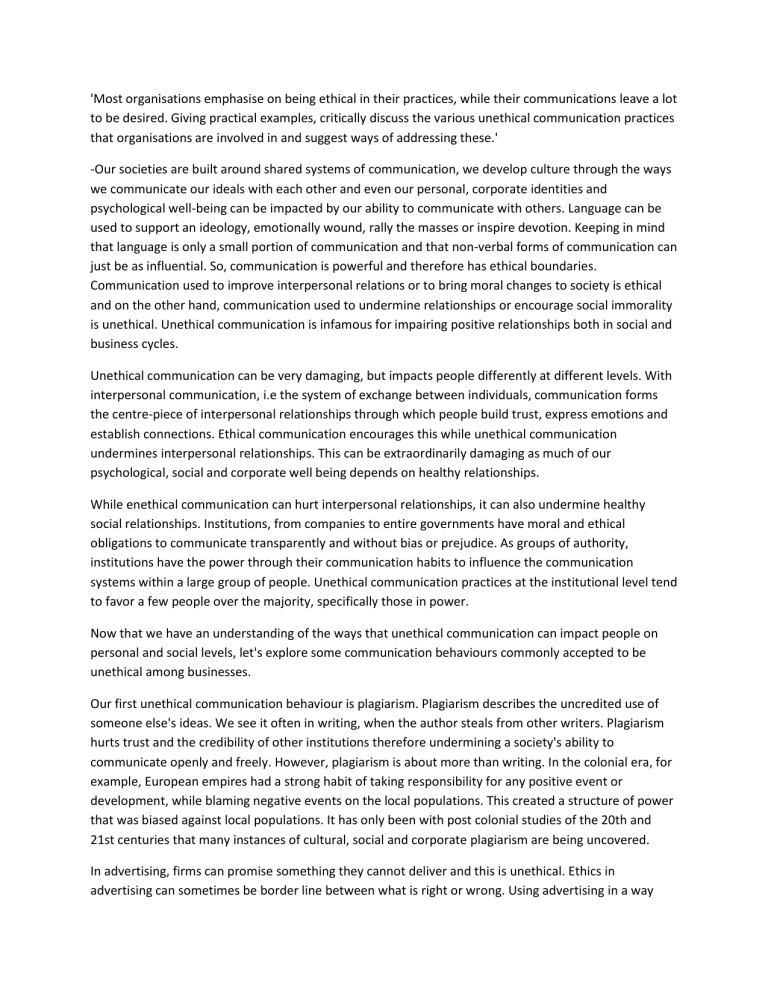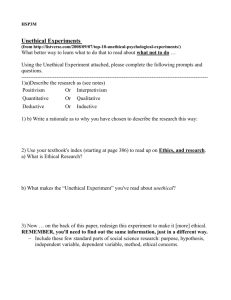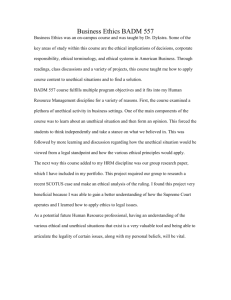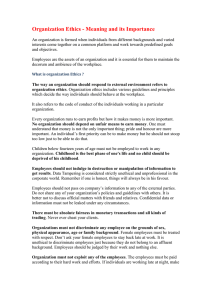
'Most organisations emphasise on being ethical in their practices, while their communications leave a lot to be desired. Giving practical examples, critically discuss the various unethical communication practices that organisations are involved in and suggest ways of addressing these.'
-Our societies are built around shared systems of communication, we develop culture through the ways we communicate our ideals with each other and even our personal, corporate identities and psychological well-being can be impacted by our ability to communicate with others. Language can be used to support an ideology, emotionally wound, rally the masses or inspire devotion. Keeping in mind that language is only a small portion of communication and that non-verbal forms of communication can just be as influential. So, communication is powerful and therefore has ethical boundaries.
Communication used to improve interpersonal relations or to bring moral changes to society is ethical and on the other hand, communication used to undermine relationships or encourage social immorality is unethical. Unethical communication is infamous for impairing positive relationships both in social and business cycles.
Unethical communication can be very damaging, but impacts people differently at different levels. With interpersonal communication, i.e the system of exchange between individuals, communication forms the centre-piece of interpersonal relationships through which people build trust, express emotions and establish connections. Ethical communication encourages this while unethical communication undermines interpersonal relationships. This can be extraordinarily damaging as much of our psychological, social and corporate well being depends on healthy relationships.
While enethical communication can hurt interpersonal relationships, it can also undermine healthy social relationships. Institutions, from companies to entire governments have moral and ethical obligations to communicate transparently and without bias or prejudice. As groups of authority, institutions have the power through their communication habits to influence the communication systems within a large group of people. Unethical communication practices at the institutional level tend to favor a few people over the majority, specifically those in power.
Now that we have an understanding of the ways that unethical communication can impact people on personal and social levels, let's explore some communication behaviours commonly accepted to be unethical among businesses.
Our first unethical communication behaviour is plagiarism. Plagiarism describes the uncredited use of someone else's ideas. We see it often in writing, when the author steals from other writers. Plagiarism hurts trust and the credibility of other institutions therefore undermining a society's ability to communicate openly and freely. However, plagiarism is about more than writing. In the colonial era, for example, European empires had a strong habit of taking responsibility for any positive event or development, while blaming negative events on the local populations. This created a structure of power that was biased against local populations. It has only been with post colonial studies of the 20th and
21st centuries that many instances of cultural, social and corporate plagiarism are being uncovered.
In advertising, firms can promise something they cannot deliver and this is unethical. Ethics in advertising can sometimes be border line between what is right or wrong. Using advertising in a way
that is misleading using false claims to get the public to buy the product one is trying to sell is highly unethical. Lying about the product gives false information and makes consumers believe that something is true when it is not. Unethical advertising is not only unacceptable, but also unfair and costly to the consumer. The primary focus of advertisement is to enhance the business profitability therefore many companies ignore many social aspects while designing an advertising campaign.
While it may even rise to the level of being illegal, unethical communication practices can have more serious consequences if unaddressed. It can create a toxic work environment in which employees and business ultimately suffer. At large businesses, a human resources department or manager may set the tone for corporate behaviour by creating a code of ethics. A code of ethics establishes values that are important to a business and creates a common framework for understanding the boundaries within the organisation. Codes of ethics should be communicated in broad, idealist terms clearly outlining the company's ethical vision, yet be succinct enough to be contained in a values statement. If it makes sense, include ethical expectations in the company's mission statement and employee handbooks. Also, including key employees in the process of drafting and formalizing the code of ethics ensures that leaders are on board with and committed to the values.
Protocol for reporting must be established in ways of handling unethical behaviour for example in that it can set up an anonymous ethics hotline, such as requesting private meetings with the appropriate manager or supervisor. Additionally, if a concern or violation is reported and the company lacks internal
HR resources, ensure that the person tasked with responding is the furthest from the concern.
Delegating someone as far removed as possible sets a tone that the concern will be taken seriously and creates trust in your company's ability to address the matter fairly. If retaining an appropriate internal person isn't an option, the organisation must consider investing in an external HR partner who can bring impartiality to the process.
Employees may be empowered by granting them the know-how to appropriately identify and handle ethics violations. This can be accomplished by implementing ethics-training programmes for all new and existing employees to increase the effectiveness of the code. Company may even choose to tie to ethical behaviour some compensation incentives to further increase the relevance of the code.
Keeping the code updated is also an important step in keeping a company's ethics top of mind. In doing so, it proactively sets up an atmosphere, reinforced by both formal and informal measures, that promotes the values set forth.
If the importance of developing an ethical culture is disregarded, lawsuits, high employee turnover, low morale and even the demise of a business could result. Setting out a clear code of ethics from the outset,establishing protocol and continuously reviewing and promoting guidelines is smart and ultimately result in better business processes and therefore a more successful business.
*Examples of common unethical communication practises among businesses*
- Dumping pollutants into water supply rather than cleaning up the pollution properly.
- Releasing toxins into the air in levels above what is permitted by the Environmental Management
Agency.
- Coercing an injured worker not to report a work injury to workers' compensation by threatening him/her with the loss of a job or benefits.
- Refusing to give an employee a final pay check for hours worked after the employee leaves the company.
- Not paying an employee for all the hours worked.
- Incorrectly classifying an employee as an independent contractor and not as an employee in order to reduce payroll taxes and avoid purchasing unemployment and workers' compensation insurance.
- Engaging in price fixing to force smaller competitors out of business
- Using bait and switch or false advertising tactics to lure customers in or convince them to buy a product
- Rolling back the speedometer on a vehicle that is for sale
-
- Refusing to honor a warranty claim on a defensive product
- A lawyer representing parties on both sides of a legal transaction
- Doctor, dentists and lawyers dating their clients
- Misrepresenting facts to investors
- Promoting products that are harmful to people by referring to biased research you paid for
- Sharing information you promised to keep private




